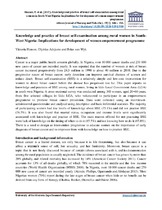| dc.contributor.author | Hanson, Victoria | |
| dc.contributor.author | Adejumo, Olyinka | |
| dc.contributor.author | van Wyk, Brian | |
| dc.date.accessioned | 2018-08-27T10:21:27Z | |
| dc.date.available | 2018-08-27T10:21:27Z | |
| dc.date.issued | 2017 | |
| dc.identifier.citation | Hanson, V. et al. (2017). Knowledge and practice of breast self-examination among rural women in South-West Nigeria: Implications for development of women empowerment programme. African Journal of Nursing and Midwifery, 19(1): 144 – 156. | en_US |
| dc.identifier.issn | 2520-5293 | |
| dc.identifier.uri | http://dx.doi.org/10.25159/2520-5293/950 | |
| dc.identifier.uri | http://hdl.handle.net/10566/3977 | |
| dc.description.abstract | Cancer is a major public health concern globally. In Nigeria, over 10 000 cancer deaths and 250 000 new cases of cancer are recorded yearly. It was reported that the number of women at risk of breast cancer increased progressively from 24.5 million in 1990 to about 40 million in 2010. Due to the progressive nature of breast cancer, early detection can improve survival chances of women and reduce death. Breast self-examination (BSE) is a relatively simple and low-cost intervention for women to detect breast cancer before the disease has progressed too far. This paper reports on knowledge and practices of BSE among rural women, living in Iddo Local Government Area (LGA) in south-west Nigeria. A cross-sectional survey was conducted among 345 women, aged 20–60 years, from five selected villages in Iddo LGA, who volunteered to participate in an empowerment programme to promote breast cancer prevention. Data were collected using an interviewer-administered questionnaire and analysed using descriptive and basic inferential statistics. The majority of participating women had low levels of knowledge about BSE (75.1%) and did not practise BSE (76.5%). It was also found that marital status, occupation and income levels were significantly associated with knowledge and practice of BSE. The main reasons offered for not practising BSE were lack of knowledge on the timing of when to do it (85.5%) and not knowing how to do it (87.8%). There is a need to design an intervention programme to educate women on the importance of early diagnosis of breast cancer and to empower them with knowledge on how to practice BSE. | en_US |
| dc.language.iso | en | en_US |
| dc.publisher | UNISA Press | en_US |
| dc.rights | This is the author-version of the article published online at: http://dx.doi.org/10.25159/2520-5293/950 | |
| dc.subject | Breast self-examination | en_US |
| dc.subject | Cancer | en_US |
| dc.subject | Knowledge | en_US |
| dc.subject | Practice | en_US |
| dc.subject | Rural | en_US |
| dc.subject | Women | en_US |
| dc.title | Knowledge and practice of breast self-examination among rural women in South-West Nigeria: Implications for development of women empowerment programme | en_US |
| dc.type | Article | en_US |
| dc.privacy.showsubmitter | FALSE | |
| dc.status.ispeerreviewed | TRUE | |
| dc.description.accreditation | DHET | |

